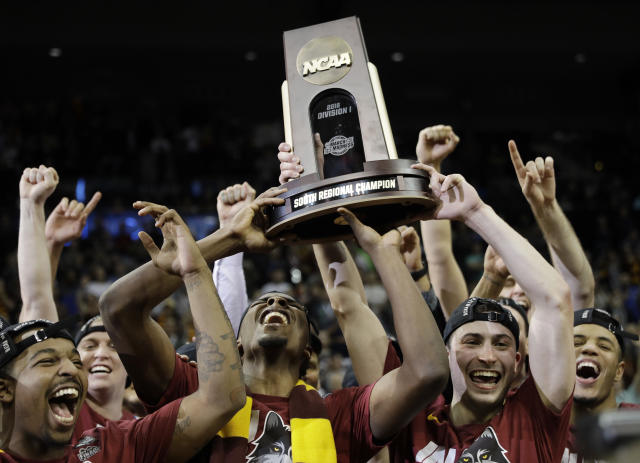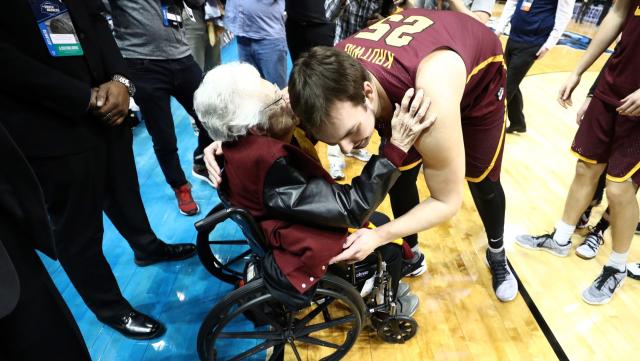
And now the next and final chapter in one of the all-time great basketball stories awaits. Little old Loyola and little old Sister Jean, the embodiment of the school’s sporting and religious faith, are heading to San Antonio to compete for the national championship.
“I’ll be there,” she said with a twinkle in her eye.
She and Loyola will be there in the nick of time, riding to the rescue of a sport tainted by scandal and burdened by a widespread federal corruption investigation.
College basketball hardly deserves this blessed turn of events, this unlikely change of narrative, this (temporary) extraction from the quagmire of its own creation. NCAA president Mark Emmert, who got down on bended knee to speak with Sister Jean here before No. 11 seed Loyola blew out No. 9 Kansas State, 78-62, to win the South Region, owes her and the Ramblers a debt of thanks for their well-timed redemptive run.
Loyola and its team laden with juniors and seniors, the antithesis of the one-and-done trade schools like Kentucky and Duke, is going to the Final Four.
Loyola and its team of low-wattage recruits, the kind of players that draw no pre-college interest from power programs or agents or sneaker pimps, is going to the Final Four.
Loyola and its lack of tens of millions in football revenue, with a head coach being paid less than $500,000 in base salary, is going to the Final Four.
Loyola of the one-bid Missouri Valley Conference, operating without margin for error in terms of earning an at-large NCAA bid, cleared a swath through opponents from multi-bid leagues. It swept aside teams from the two leagues that dominated this season: Miami of the ACC and Kansas State of the Big 12. It took down the co-champion of the SEC, Tennessee. It eliminated the regular-season champion of the Mountain West, Nevada.
“We don’t really bow down to those big schools,” said guard Clayton Custer.
The next big school in Loyola’s path is Michigan on Saturday in the Final Four. But no matter what happens there, the Ramblers will be the feel-good story of this feel-bad season.
The reasons to feel good about them were scattered all over the court after the game Saturday, pure joy infiltrating an impure sport. It’s not just a Sister Jean thing.
On the other side of the court from her stood Jerry Harkness, the 77-year-old star of the only national champion basketball team Loyola has had, in 1963. In September, Harkness and some of his old teammates talked to the Ramblers about their pioneering history, then watched practice. They liked what they saw.
“I told Jack Egan [another member of the ’63 team], ‘These guys got something,’ ” Harkness recalled. “We could see it.”
But a Final Four? At a school that hadn’t even been to the NCAA tournament since 1985? This is more than even an optimist like Harkness could foresee.
“It’s beautiful that they went [to the Final Four] before I went into a hole in the ground,” he said.
A few minutes later, as the Ramblers were bouncing off the court with their snipped nets, coach Porter Moser urgently ran and called them back. He wanted a team picture, and he knew exactly where. Moser directed his players to gather around a pile of maroon-and-gold confetti and commandeered a photographer.

Moser is in his 13th year as a college head coach. His career arc was unremarkable: two decent seasons at Arkansas Little Rock, four unsuccessful ones at Illinois State, then six more at Loyola before this season. During his time at Loyola, the Ramblers were 40 games under .500 in conference play.
But Loyola believed in Moser, a Catholic kid from the Chicago area, and he had steadily improved the product. Then came this breakthrough year, a 32-5 masterpiece in which the Ramblers played beautiful basketball. They passed brilliantly, shot effectively, guarded tenaciously and never cared who got the accolades.
“All summer long we were like, ‘Why not us?’ ” Moser said.
Now Moser’s why-not-us bunch joins Wichita State (2013), VCU (2011), Butler (2010 and ’11) and George Mason (’06) as the 21st century Final Four crashers from outside the sport’s entrenched power structure.
When Loyola’s team picture was taken, senior Ben Richardson — the South Region Most Outstanding Player after scoring a career-high 23 points on Saturday — caught the eye of fellow guard Clayton Custer. With a nod of Richardson’s head toward the stands, the childhood friends both took off sprinting for the Loyola fan section.
Richardson leaped over the media table and embraced the teary-eyed man in the first row. Then Custer did the same. The man was Ed Fritz, who coached them both at Blue Valley Northwest High School in Overland Park, Kansas. They went 94-6 playing for Fritz, winners to the core.
“They’re just the best kids in the world,” Fritz said. “There’s so many kids at home who want to grow up and be like them.”
Loyola might not have beaten Kansas State without those 23 points from Richardson, who is best known as a defensive specialist who took on a lesser offensive role this year to accommodate transfer Marques Towns and freshman big man Cameron Krutwig. But Loyola definitely would not have beaten Tennessee in the second round without Custer’s three-bounce jumper in the final seconds. Nor would it have beaten Miami in the opening round without the Donte Ingram 3-pointer at the buzzer. And it likely wouldn’t have beaten Nevada without Townes’ 3 at :06 on the game clock.
After a series of staggeringly dramatic escapes, Loyola finally had a blowout Saturday. The Ramblers were the superior team from the opening tip, built the lead to 23 at one point, survived a ragged few minutes and then coasted home with this remarkable triumph.
Little old Loyola looked so good Saturday that it freed its fans to envision something even bigger than this absurd dream.
Said Harkness: “Just win the whole damn thing.”

No comments:
Post a Comment